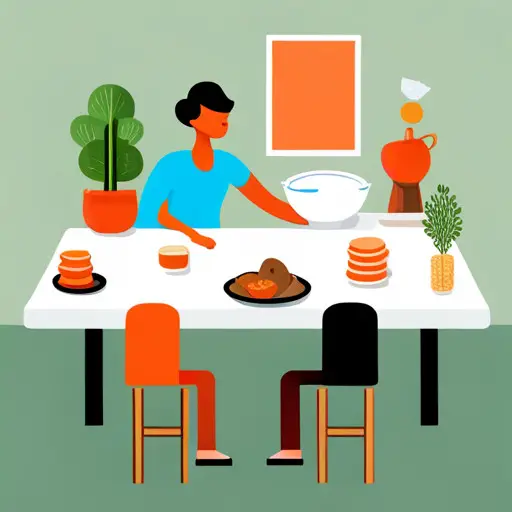You never imagined yourself dating someone with an eating disorder. Yet, here you are, in a relationship with someone who struggles with their relationship to food and their body. It can be confusing and overwhelming to navigate all the complexities that come with this situation. On one hand, you care deeply for your partner and want to support them as best as you can. On the other hand, you may feel unsure about what to say or do around certain triggers or challenges.
While it’s normal to feel a range of emotions when dating someone with an eating disorder, it’s important to remember that this is not something your partner chose or can easily control. Eating disorders are serious mental health conditions that require patience, compassion, and understanding from those around them. In this article, we’ll explore some ways you can show up for your loved one while also taking care of yourself in the process.
Key Takeaways
– Understanding eating disorders is crucial for empathy and support
– Setting healthy boundaries and prioritizing self-care is important
– Knowing what might trigger your partner and working together to avoid triggers as much as possible is crucial
– Recovery from an eating disorder is a journey, with setbacks along the way, and approaching setbacks with empathy and kindness and prioritizing self-care practices is necessary for both partners to thrive in the long run.
Understanding Eating Disorders

Understanding eating disorders is crucial when dating someone who may be struggling with one, as it allows for greater empathy and support. Eating disorders are complex mental illnesses that affect a person’s relationship with food, body image, and self-esteem. They can take on many forms, including anorexia nervosa, bulimia nervosa, binge-eating disorder, and others. It’s important to recognize that eating disorders are not just about food; they stem from deeper emotional issues that require professional help.
When dating someone with an eating disorder, it’s essential to educate yourself about the condition. Learn about the signs and symptoms of different types of eating disorders so you can recognize them in your partner. Be aware that people with these conditions may try to hide their behavior or deny that there is a problem. Try to approach the topic sensitively and without judgment.
Remember that communication and support are key when dealing with an eating disorder. Your partner needs to know they have your unconditional love and support during their recovery journey. Listen actively when they talk about their feelings or struggles around food or their body image. Encourage them to seek professional help if needed but respect their boundaries if they’re not ready yet. By being understanding and supportive, you can help your partner navigate this challenging time together.
Communication and Support

You just love it when your partner cancels plans last minute due to a ‘stomach ache’ that you know is really their eating disorder acting up again. It can be frustrating and confusing to navigate a relationship with someone who has an eating disorder, but communication and support are key. Make sure to have open and honest conversations with your partner about how they’re feeling, what triggers them, and how you can best support them.
It’s important to remember that recovery is not linear and setbacks will happen. Don’t get discouraged or blame yourself if things don’t go smoothly. Offer words of encouragement and remind your partner that you are there for them no matter what. Additionally, make sure to take care of yourself as well by seeking out therapy or support groups if needed.
By being a supportive partner, you can help your loved one on their journey towards recovery. However, it’s also important to set boundaries for yourself and practice self-care. Remember that you cannot fix or control another person’s illness, so make sure to prioritize your own mental health as well. In the next section we’ll discuss more about setting healthy boundaries in a relationship with someone who has an eating disorder.
Self-Care and Boundaries

Take care of yourself and set clear boundaries in your relationship with someone who struggles with their mental health. It’s important to prioritize your own well-being while supporting your partner through their eating disorder journey. Here are some ways to practice self-care and establish healthy boundaries:
– Take time for yourself: Make sure you’re taking breaks to recharge and engage in activities that make you happy. This could be anything from reading a book to going for a run.
– Be honest about your needs: Don’t be afraid to communicate what you need from the relationship, whether it’s more space or more affection. Your partner may not always be able to meet these needs, but it’s important to express them.
– Set limits on caretaking: It can be easy to fall into the trap of trying to “fix”your partner’s eating disorder, but ultimately they are responsible for their own recovery. Set boundaries around how much emotional labor you’re willing and able to do.
By taking care of yourself and setting boundaries, you’ll be better equipped to support your partner through the challenges that come with an eating disorder. In the next section, we’ll discuss navigating triggers and challenges in more detail.
Navigating Triggers and Challenges

Navigating the challenges and triggers that arise in a relationship with a partner struggling with their mental health can feel overwhelming, but it’s important to remember that you are not alone. One of the biggest challenges when dating someone with an eating disorder is knowing what might trigger them. This could be anything from certain foods or situations to specific comments or behaviors. It’s essential to communicate openly with your partner about their triggers and work together to avoid them as much as possible.
In addition to avoiding triggers, it’s also crucial to know how to respond when your partner does experience a trigger or challenge. This might mean being patient and understanding while they work through difficult emotions, offering support and encouragement during meal times, or seeking professional help if needed. Remember that recovery from an eating disorder is a journey, and there will likely be setbacks along the way. It’s essential to approach these setbacks with empathy and kindness rather than judgment or frustration.
Navigating triggers and challenges in a relationship with someone who has an eating disorder can take a toll on your own mental health and well-being. It’s important to prioritize self-care practices like therapy, exercise, hobbies you enjoy, spending time with friends/family members who uplift you etc., so that you’re better equipped to handle the ups and downs of your partner’s journey towards recovery. Taking care of yourself isn’t selfish; it’s necessary for both you and your relationship to thrive in the long run.
Frequently Asked Questions
Can dating someone with an eating disorder trigger the development of an eating disorder in the partner?
Dating someone with an eating disorder cannot trigger the development of an eating disorder in you. However, it is important to prioritize your partner’s mental health and support their recovery journey.
How can I help my partner with an eating disorder without crossing any boundaries or making them feel uncomfortable?
Helping your partner with an eating disorder requires open communication, empathy and understanding. Avoid pushing them to eat or commenting on their weight. Encourage them to seek professional help and be supportive throughout the process.
Is it possible for someone with an eating disorder to recover while in a relationship?
You may feel like recovery with a partner is impossible, but it’s not. With support and understanding, your partner can make progress towards healing. Remember to prioritize their needs and boundaries throughout the process.
How can I encourage my partner to seek professional help for their eating disorder?
Encourage your partner to seek professional help by expressing your concerns in a non-judgmental way, offering support and resources, and reminding them of the benefits of treatment. Seek guidance from a therapist or support group if needed.
What role does family and friends play in supporting someone with an eating disorder while in a relationship?
As a friend or family member, you can provide emotional support and encourage your loved one to seek professional help. Avoid making comments about their weight or appearance, and instead focus on their well-being.
Conclusion
Congratulations, you have now reached the end of this informative article on dating someone with an eating disorder. It is not an easy journey, but it can be a rewarding one if approached with understanding and patience.
Remember that just like a delicate flower, your partner requires care and attention to bloom into their fullest potential. With open communication, unwavering support, and healthy boundaries, you can nourish the relationship and help them on their path to recovery. Just as a gardener tends to their garden, you must tend to your partner’s needs with love and compassion.
So take heart in knowing that although there may be challenges ahead, you are equipped with the knowledge and tools to navigate them successfully. With time and dedication, your relationship can blossom into something truly beautiful – a testament to the power of love and resilience in overcoming even the greatest obstacles.

